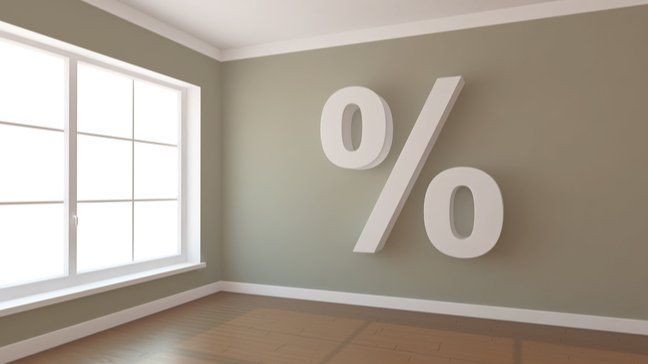When you start looking to buy a house, you’ll hear all about mortgage rates and how much it sucks that they’re going up, how great it is if they’re going down, or even why low mortgage rates aren’t always a good thing.
Your mortgage rate is simply the amount of interest charged by the lender you use to purchase your house.
So how do you get to this percentage? And how will it really affect how much you pay? For the purposes of this article, I’ll take a look at how just a 1% difference in your mortgage rate can seriously affect how much you pay.
As you’ll see in the table below, a 1% difference between a $200,000 home with a $160,000 mortgage increases your monthly payment by almost $100. Although the difference in monthly payment may not seem that extreme, the 1% higher rate means you’ll pay approximately $30,000 more in interest over the 30-year term. Ouch!
How mortgage interest rates work
A mortgage is a type of loan used to purchase a home or other real estate. The interest rate on a mortgage is the percentage of the total loan amount that you will have to pay in addition to the principal, or original, loan amount.
The interest rate on a mortgage is usually expressed as an annual percentage rate, or APR. This means that you will have to pay back the loan plus interest charges over the course of the life of the loan. The interest rate on a mortgage can be fixed or variable, depending on your lender’s terms and conditions.
If you have a fixed-rate mortgage, then your interest rate will not change over the life of the loan. But if you have an adjustable-rate mortgage, then it can fluctuate based on the Prime rate, for example.
How a 1% difference in mortgage rate affects what you pay

In this example, let’s say you’re looking to take out a home loan for $200,000. If you get a 30-year mortgage and you make a 20% down payment of $40,000, you’ll have a $160,000 mortgage.
If you only put down 10%, you’ll have a $180,000 mortgage. The following table shows you how much you’ll pay — both per month and over the life of the loan — in each scenario.
| Mortgage rate | Payment, 20% down | 30-yr. interest, 20% down | Payment, 10% down | 30-yr. interest, 10% down |
|---|---|---|---|---|
| 3.5% | $718 | $98,780 | $808* | $111,058 |
| 4% | $764 | $115,280 | $859* | $129,481 |
| 4.5% | $811 | $132,129 | $912* | $148,345 |
| 5% | $858 | $149,641 | $966* | $167,992 |
| 5.5% | $908 | $167,302 | $1,022* | $187,938 |
| 6% | $959 | $185,522 | $1,079* | $208,632 |
| 6.5% | $1,011 | $204,302 | $1,137* | $230,119 |
| 7% | $1,064 | $223,630 | $1,197* | $251,584 |
| 7.5% | $1,118 | $243,481 | $1,258* | $273,670 |
*Payment amounts shown do not include private mortgage insurance (PMI), which may be required on loans with down payments of less than 20%. The actual monthly payment may be higher.
This calculation also does not include property taxes, which could raise the cost substantially if you live in a high-tax area.
In this example, a 1% mortgage rate difference results in a monthly payment that’s close to $100 higher. But the real difference is how much more you’ll pay in interest over 30 years…more than $33,000! And just think, if you lived in the 1980s when the highest mortgage rate was 18%, you’d be paying thousands a month just in interest!
You can calculate your own mortgage rate using our simple mortgage rate calculator or get personalized rates after answering a few simple questions with Mortgage Research Center.
What’s currently happening to mortgage rates?
COVID-19 pushed mortgage interest rates down to record lows, dipping to a jaw-dropping 2.67% in December 2020. Unfortunately, 30-year fixed mortgage rates have since ballooned to an average of 8.48% as of November 2023.
But don’t feel too bummed out. Consider that back in the 80s, a typical mortgage rate was between 10% and 18%, and a 8.x% rate doesn’t seem too bad, comparatively. Of course, the cost of real estate has risen since then, but mortgage rates themselves are still substantially lower than they could be.
How to get the lowest mortgage rate
Unfortunately, you don’t have a great deal of personal control over the average interest rates offered at any given time. But you do have quite a bit of control over the rates you’ll be offered relative to the average.
The first step to ensuring you’ll get the lowest rate possible is to shop around for multiple offers.
Mortgage Research Center is the Internet's leading source for mortgage rates from dozens of lenders.
Answer a few questions to see your personalized mortgage rates in minutes.
- Purchase or refi
- Won't affect your credit
- Options for first-time buyers, VA and FHA loans
- Must provide your email address
Other factors that determine your mortgage rate

Aside from thoroughly researching several different lenders, there are a handful of key variables that will influence the rates you’re offered:
Credit
More than any other factor, your credit score will determine your mortgage rate.
Your mortgage is a loan, so like any other loan, you’ll need a very good credit score to qualify for the best rate. This means a FICO score of at least 700. To get the best rates, a score above 740 is even more desirable.
Down payment
The bigger your down payment, the lower the mortgage rate. If you put down 20% or more, lenders see you as a lower risk because you have as much at stake in the property as they do.
Not only your down payment, but your loan length determines your rate, for the same reason. The shorter your loan, the less risk for the lender. So, if possible, a 15-year mortgage is better than a 30-year mortgage.
Income stability
Your lender obviously wants to know that you have a stable job so you can pay off the loan they’re giving you.
If you’ve just changed careers, own your own business, earn your income mostly from freelancing, or have less than a consistent two-year work history, you’re less likely to get the best rates.
These scenarios demonstrate that your financial situation has been subject to change in the past. Even if you own your own seemingly stable business, this still makes you a greater risk because you have more to lose.
Area
Where you live can have a bearing on your rate. Rates vary by state and tend to be based on how well the housing market is doing in your state.
If the market is healthy where you’re looking, a lender will likely charge a lower rate because there’s less of a risk of default.
Type of loan
There are different types of loans you may qualify for that impact your mortgage rate.
15-year and 30-year mortgages are the most common, with 20% typically required as a down payment. However, FHA loans (which get their name from the Federal Housing Administration) require much smaller down payments (as little as 3.5%). On the other hand, FHA loans may also require the homeowner to purchase private mortgage insurance, which protects the lender against default.
How mortgage points work
In the mortgage world, there are these things called mortgage points. In the simplest terms, a point is an upfront fee paid to lower your interest rate by a fixed amount (usually 0.125%).
For example, if you take out a $200,000 loan at 4.25% interest, you might be able to pay a $2,000 fee to reduce the rate to 4.125%.
Paying points makes sense if you: 1) have the cash to pay them AND you 2) plan to hold the loan for a long time.
If you don’t hold the loan long enough, the upfront cost of paying points often outweighs interest savings over time. You’ll want to consider points carefully. If you’re fairly certain that you will stay in your home for a long time and that you will not pay off the mortgage or refinance early, points can save you a good deal of money.
If, however, you pay points and, just a few years later, move, refinance, or pay off your mortgage, you’ll likely fare worse than if you did not pay points and instead took out a loan with a higher rate.
Summary
In short, mortgage rates matter. While a difference of 1% may not seem substantial, even when you’re comparing monthly mortgage payments on a modest loan amount, the additional amount you could end up paying in interest is staggering.
And, of course, the larger your loan amount, the greater these differences will be. Being able to qualify for a low mortgage rate will keep your monthly payment lower, yes, but it’ll also allow you to save tens of thousands of dollars over your lifetime.
» Compare your best mortgage rates with Mortgage Research Center
